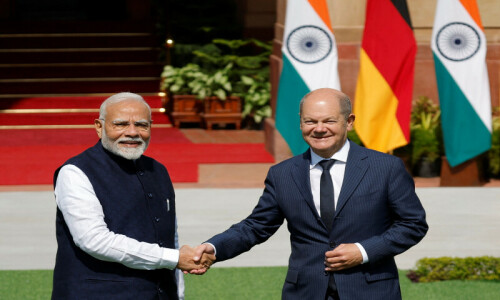German: After meeting with Indian Prime Minister Narendra Modi on Friday, German Chancellor Olaf Scholz stated that he wants to strengthen defense ties with New Delhi and bring the militaries of the two countries closer together.
At a time when the West is trying to counter China’s growing influence, Germany is attempting to join India’s effort to wean its arms base from decades of dependence on Russia. India and Germany have not traditionally had close defense ties.
Scholz stated, “Our overall message is clear, we need more cooperation, not less.”
“We also want to deepen cooperation in defense at our intergovernmental consultations with India and agree to bring our militaries together.”
Scholz is leading a high-level delegation to New Delhi, where he is accompanied by the majority of his cabinet. He hopes that gaining access to the vast Indian market will reduce Germany’s reliance on China.
In a $5 billion deal, German Thyssenkrupp is one of two bidders to partner with Indian companies to build six conventional submarines in India.
Soon, the Indian Navy will likely choose between the German company and the Spanish Navantia.
Modi stated that among numerous potential investments in transportation infrastructure, New Delhi and Berlin are working on projects involving renewable energy.
Modi stated to Scholz at the Asia-Pacific conference of German business held in the Indian capital, “India is completely transforming its physical infrastructure.”
“Investments of record are being made. Companies in Germany and the Indo-Pacific region can take advantage of this.
Germany has pledged 10 billion euros to assist India in achieving its climate goals in 2022.
According to an official named Jochen von Frowein, the DEG unit of the German state lender KfW, which focuses on the private sector, plans to more than double its investment in India to $1 billion over the course of the next few years, with a focus on renewable energy and infrastructure.
India-EU FTA Scholz reiterated his economy minister’s call for rapid progress in negotiations for a free trade agreement between India and the European Union.
Scholz stated, “I am certain that if we work on this together, prime minister, this could happen in months instead of years.”
Trade Minister Piyush Goyal had previously stated that if the bloc demanded access to the Asian giant’s dairy industry, India would be unable to reach a similar agreement.
Following German Economy Minister Robert Habeck’s remarks on Thursday that agriculture was the talks’ “most problematic” area and suggested that they first tackle the industrial sector, Goyal told the conference that a trade deal could be reached quickly if sensitivities were respected on both sides.
Progress has been delayed on the discussions, at first designated to be wrapped up toward the finish of 2023, with India faulting the EU for what it called “silly” guidelines, as one explanation.



